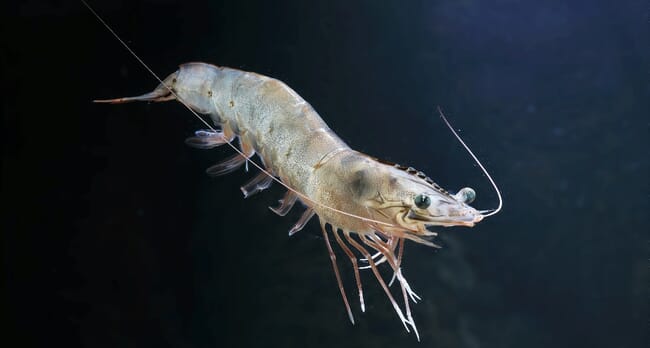
The researchers from IOCAS now know why © IOCAS
The study, which was published in Science of the Total Environment on 5 April, found that the α-crystallin domain-containing (ACD-containing) gene family exhibited a significant expansion in penaeid shrimp species in comparison with other crustaceans. These genes are mainly expressed in the muscle of shrimp.
"Our work provides important insights into the mechanisms by which penaeid shrimp survive in adverse environments and will be helpful for the aquaculture industry and the genetic breeding of shrimp with high adaptability to the environment," said Prof Li.
Unlike typical small heat shock proteins (sHSPs), the ACD-containing proteins in penaeid shrimp contain additional ACD domains (3-7 domains, in general), resulting in larger molecular weight and more complex 3D structure.
Researchers detected their responses to high temperature through RNA-sequencing and quantitative reverse-transcription polymerase chain reaction (qRT-PCR). Heterologous expression in Escherichia coli (E. coli) and citrate synthase assays of three representative ACD-containing genes confirmed that their chaperone activity could enhance the thermo-tolerance.
Notably, the researchers noticed that in comparison with penaeid shrimp species with a relatively low thermo-tolerance (Fenneropenaeus chinensis and Marsupenaeus japonicus), the thermo-tolerant species (Litopenaeus vannamei and Fenneropenaeus indicus) contained more ACD-containing genes, which resulted from tandem duplications in their genomes. In addition, they exhibited biased expression levels under high temperatures.
"We concluded that these expanded ACD-containing genes of penaeid shrimp serve as new chaperones. Besides, they underwent independent expansion in thermo-tolerant penaeid shrimp, and finally contribute to their divergent thermo-tolerance phenotypes and adaptations to the ecological environment," said Dr Zhang Xiaoxi, lead author of the study.
"Combined with an integrated analysis of multi-omics data and solid experimental validations, the features and functions of ACD-containing genes were comprehensively elucidated," said Prof Zhang Xiaojun.




